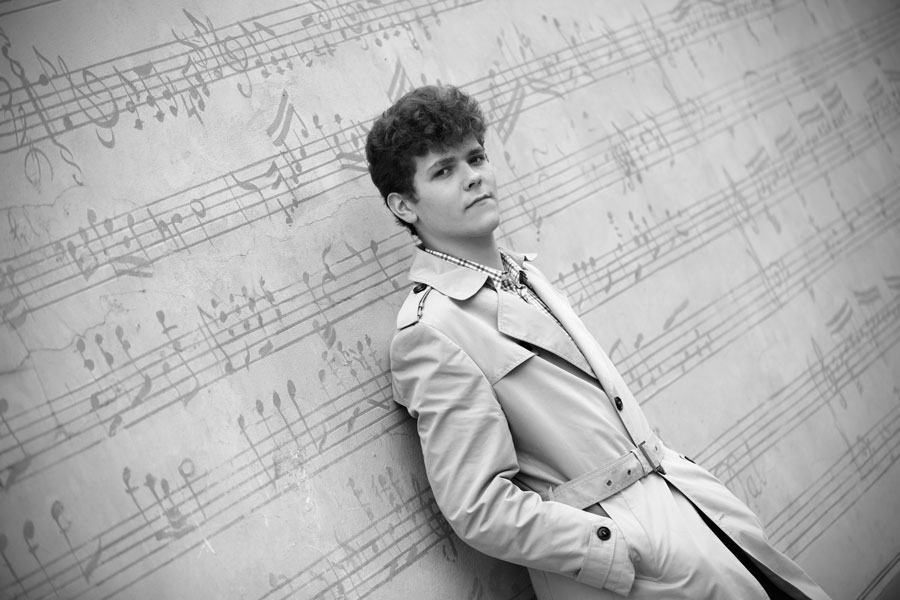Giancarlo Guerrero, a native of Costa Rica, is a five-time Grammy award winning Music Director of the Nashville Symphony Orchestra, a post he has held since 2009 and recently committed to through the 2024-25 season. Guerrero previously held posts as the Principal Guest Conductor of The Cleveland Orchestra Miami Residency from 2011 to 2016, Music Director of the Eugene Symphony between 2002 and 2009, and Associate Conductor of the Minnesota Orchestra from 1999 to 2004. The Narodowe Forum Muzyki is very pleased with the appointment of Giancarlo Guerrero to the position of Artistic Director of the Wroclaw Philharmonic! Guerrero will conduct four weeks during the 2017 season in Wrocław, and beginning with the 2018 season, he will spend eight weeks per season with the orchestra in addition to touring and recording activities.
Szymon Nehring was born on September 29, 1995, in Kraków. He currently studies under Stefan Wojtas at Bydgoszcz Academy of Music. In 2014, he won First Prize at the Arthur Rubinstein in memoriam Competition in Bydgoszcz, Second Prize at the Premio Academia in Rome, and First Prize at the Halina Czerny Stefańska in memoriam Competition in Poznań. In October 2015 he performed in the finals of the 17th Fryderyk Chopin International Piano Competition garnering an Honourable Mention and the Audience Prize. He was honoured in 2016, with the Supersonic Pizzicato Award from Pizzicato Magazine after the debut of his album Chopin, Szymanowski, Mykietyn. Nehring is a recipient of the Pro Musica Bona Foundation Scholarship and the Ministry of Culture and National Heritage Scholarship and he also received a Krystian Zimerman Scholarship. In 2017 Nehring won First Prize at the 15th Arthur Rubinstein International Piano Master Competition.
Karol Szymanowski’s Overture in E Major was among his first orchestral pieces. He composed it in 1904, and it was premiered on February 6, 1906. Szymanowski reorchestrated the work in 1912, and the subsequent version is now most often performed. The composition shows considerable influence by the German school of composition and is often compared to Strauss’ orchestral tone poems.
Undoubtedly the leading Polish composer between Chopin and Lutosławski, Szymanowski drew inspiration from a wide range of influences, which he later merged with his explorations of folk music from his native Poland. Together with writers and visual artists, Szymanowski was part of the Young Poland movement, which offended the conservative establishment. A 1907 commentary read the Young Poland composers were, “possessed by some evil spirit that deprived their work and stripped it of personal and national characteristics.” Szymanowski expressed his attitude toward “national characteristics” asserting, “Let our music be national in its Polish characteristics but not falter in striving to attain universality. Let it be national, but not provincial.”
Ignacy Jan Paderewski was born in Kursk, Podolia, on November 6, 1860. He wrote the allegro of his Piano Concerto in A minor in 1882 and finished it in the summer of 1888 in Paris. Though the composition was written over several years and in various locations, one portion for instance, in 1884 in Zakopane, Kraków and Vienna, while Paderewski was studying piano under Teodor Leszetycki, to whom the concerto is dedicated. The first performance was given January 20, 1889, in Vienna by Anetta Jessipowa, Leszetycki’s wife, accompanied by an orchestra conducted by Hans Richter. Music critic Jan Kleczyński wrote, “Paderewski’s work has beautiful themes, full of warmth in the first part, poetic in the romance and packed with passion in its finale; the orchestra is often combined with the piano in witty combinations, whereas the solo instrument is conducted exquisitely.”
At an early age, Paderewski had taken lessons with Piotr Sowiński, but he was mostly self-taught, and he quickly gained a reputation as a gifted pianist and outstanding improviser. In the summer of 1872, he was taken to Warsaw where he was admitted to the Music Conservatory, from which he graduated in 1878. Paderewski’s work has inspired artists, poets, and painters as well as other composers. Sir Edward Elgar used various motives taken from Paderewski's Fantaisie Polonaise in his symphonic Prelude 'Polonia' and Camille Saint-Saens dedicated a Polonaise for two pianos to Paderewski. The American poet John H. Finley directed the following poem to the pianist,
Your touch has been transmuted into sound
As perfect as an orchid or a rose,
True as a mathematic formula
Yet full of color as an evening sky.
But there's a symphony that you've evoked
From out of the hearts of men, more wonderful
Than you have played upon your instrument...
Alixandra Porembski, English Language Annotator

